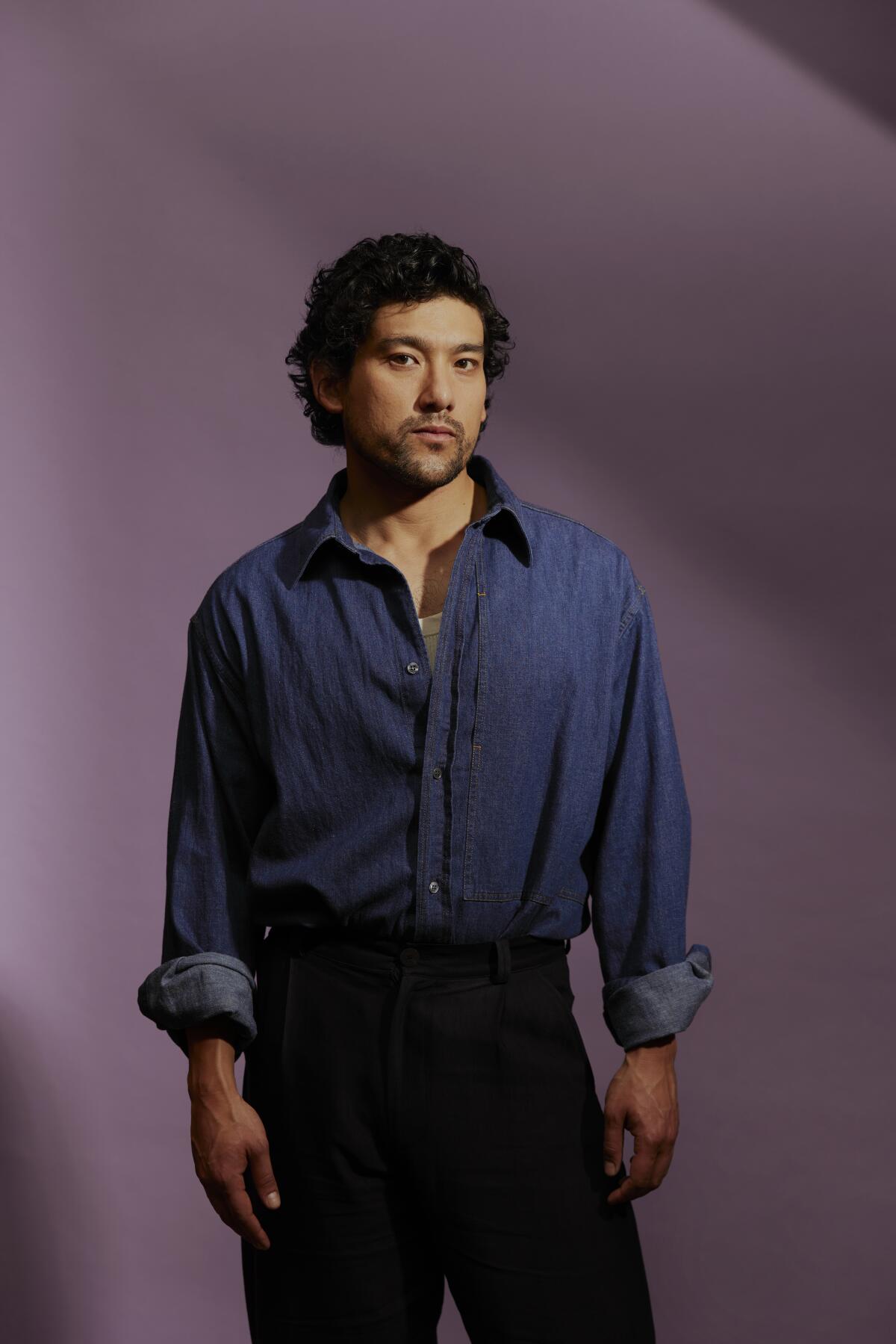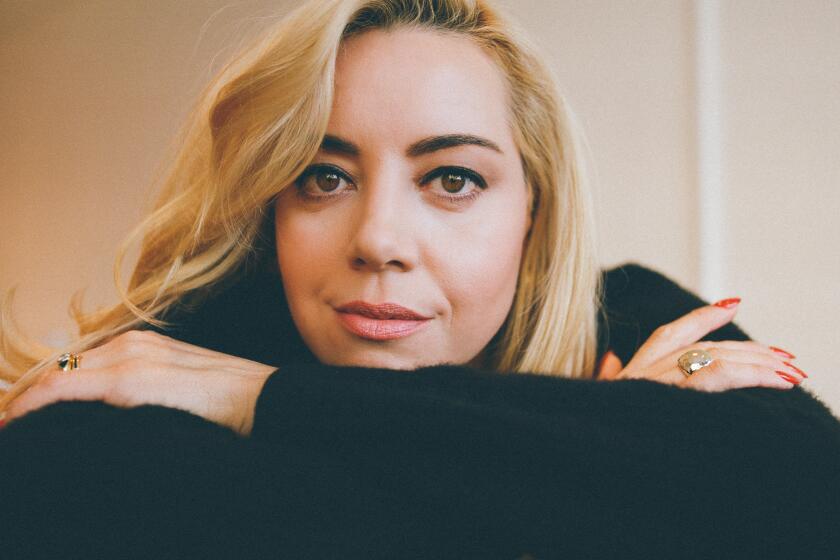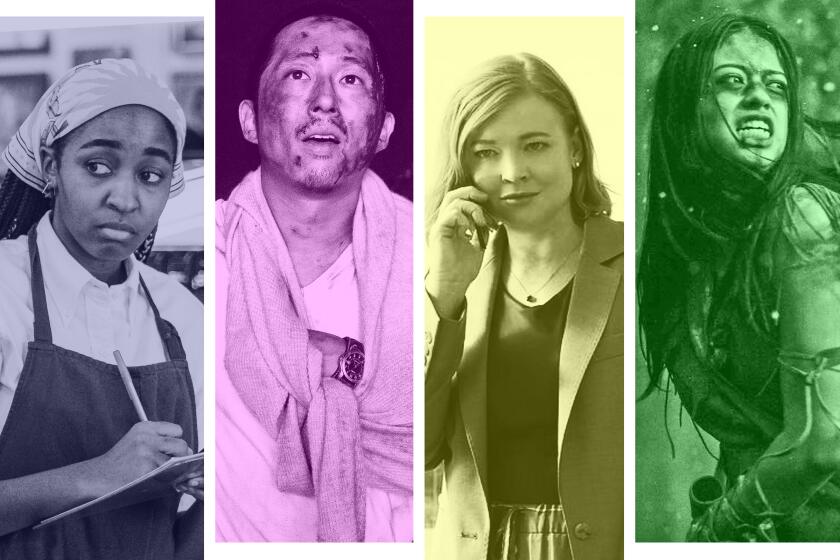How Will Sharpe unraveled his passive and mysterious ‘White Lotus’ character

- Share via
When Will Sharpe was trying to understand Ethan, the tightly wound tech genius he’d play on “The White Lotus,” he found himself returning to the character’s penchant for jogging.
“It felt like a big clue was the running,” he says during a video call from London. “There was something about that that felt important to the character — I guess the discipline and that he’s somebody who’s trying to keep a regularity to his life. Even if, internally, there’s actually absolute chaos, he’s trying to keep this level of control.”
Throughout the second season of “The White Lotus,” set at a swoon-inducing Italian resort, mild-mannered Ethan sticks to his jogging routine, a respite from the growing estrangement he feels from his wife, Harper (Aubrey Plaza), and the lingering resentment he harbors toward Cameron (Theo James), his needling alpha-male college roommate who has remained in his orbit. On vacation with Cameron and his seemingly vapid, picture-perfect wife Daphne (Meghann Fahy) after selling his company for a fortune, the working-class entrepreneur is new to this world of one-percenter opulence, both intrigued and repelled by the luxury that Cameron has known all his life. Jogging is the one thing that still feels normal to Ethan.
Unlike his esteemed co-stars, Sharpe isn’t principally an actor, recently directing his third feature, the biopic “The Electrical Life of Louis Wain,” and the true-life drama series “Landscapers.” (He also created the dark, British comedy “Flowers.”) His last stint in front of the cameras was 2019’s “Giri/Haji,” a British crime series that won him a BAFTA. But he wasn’t anxious about returning to performing — if anything, he was excited.
The actor dishes about Italian excursions with her co-stars, being ‘suspicious’ of Marvel and why series creator Mike White is like the ‘Pied Piper.’
“I do remember those conversations where people are discussing what [project] they’ve just come from, and I’m realizing I had been in the director’s chair for three years,” Sharpe says, laughing sheepishly. “I definitely was aware of the oddness of suddenly being a part of the show. But I had missed it — and one of the things that really made me miss it was I’d just done ‘Landscapers.’ Watching brilliant actors like David Thewlis and Olivia Colman — watching them have such a good time — that was very gratifying to me as a director but also really made me miss that process and the thrill of that.”
Still, Sharpe had to wrestle with Ethan’s mysteries as the passive character navigates a rocky impasse in his marriage, eventually nearly getting involved in a one-night hookup with two local sex workers, whose come-ons he rejects — as opposed to the womanizing Cameron. Ethan is a decent but insecure fellow, and Sharpe drew from his own childhood growing up in Tokyo and then moving to the UK at age 8 when, he says, he struggled to assimilate into a new culture. In a sense, Ethan is doing something similar as he cautiously dips his toe into this surreal world of privilege.
“There are a few different ways to interpret the story of that quartet,” Sharpe offers. “One of them is that Harper and Ethan take some small piece of Daphne and Cameron’s lifestyle — maybe if [they] take a little bit of it, it can get them out of the rut that they’re in. But there’s another interpretation, which is that Harper and Ethan are innocently on this first-ever luxury vacation, and it’s a corruption or an induction into this world. Ethan spends the holiday trying to behave by the rules that he thinks life should be lived by — but in the end, it’s like, ‘Well, if you want to exist on this plane with us, you need to live by our rules, and those are the rules of white privilege.’ So he’s becoming the very thing that he hates. I think you can see it however way you want, really.”

“White Lotus” writer-director Mike White encouraged embracing such mysteries, especially among his cast. Before the season begins, Ethan has stopped sleeping with Harper, retreating to the safety of porn rather than face their marital issues, but White wouldn’t provide Sharpe with easy explanations for this sexless relationship.
“I asked Mike, ‘Is there some root problem that, if they confronted it, it would fix everything?’” Sharpe recalls. “He didn’t want there to be that — he just wanted it to be simply about two people who loved each other who had been together for a very long time. What comes with that is atrophy. There was one time where we were filming a scene, and I was like, ‘This is really sad.’ His response was, ‘It’s really normal.’”
In late March, Sharpe announced he’ll be helming an adaptation of Japanese Breakfast frontwoman Michelle Zauner’s memoir, “Crying in H Mart.” But in terms of his career path, he says, “I’ve never had a plan. I always will just try and make decisions based on instinct. I think I’ll always write, I’ll always want to generate work to direct. But I also love collaborating. I love meeting new people, and I think you always learn something from every job, whatever your role is within it. It is a strange privilege as a director who acts to get a sense of how other people work and what it feels like to be on other sets.”
Our BuzzMeter panel of veteran TV journalists predicts the winners in 14 categories of the 2023(?) Emmys. You can, too, in our weekly polls.
More to Read
From the Oscars to the Emmys.
Get the Envelope newsletter for exclusive awards season coverage, behind-the-scenes stories from the Envelope podcast and columnist Glenn Whipp’s must-read analysis.
You may occasionally receive promotional content from the Los Angeles Times.










